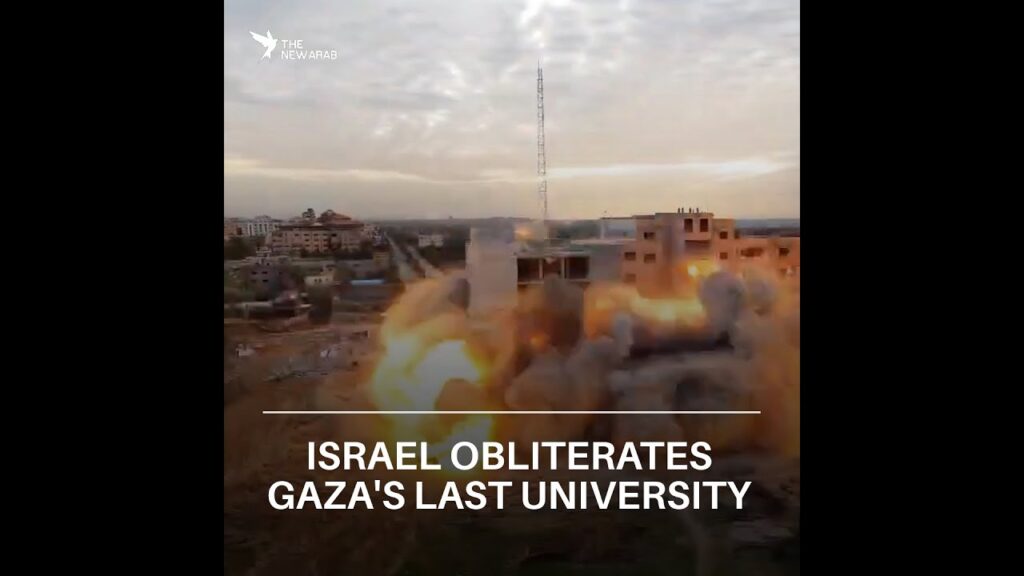Written by Chandni Desai, University of Toronto | –
(Conversation) – Since the start of Israeli shelling and attacks on the Gaza Strip, the education system in Gaza has suffered a major blow. Last month, Israel bombed Al-Islah University, Gaza's last surviving university.
In the past four months, 12 universities in Gaza have been bombed, in whole or in part, and most destroyed.
Approximately 378 schools were destroyed or damaged. The Palestinian Ministry of Education reported the deaths of 4,327 students, 231 teachers, and over 94 professors.
Many cultural heritage sites, including libraries, archives, and museums, have also been destroyed, damaged, and looted.
However, attacks on Palestinian educational and cultural facilities did not begin in response to the October 7 attack. Israel has a long record of targeted attacks against Palestinian institutions that produce knowledge and culture. Its history includes targeting and assassinating Palestinian intellectuals, cultural producers, and politicians.
What is academic decline?
The destruction of educational systems and buildings is known as “academic murder,” a term first coined by Oxford University professor Karma Nabulsi during the Israeli attack on Gaza in 2008-2009. “Scholasticide” describes the systematic destruction of Palestinian education against the backdrop of decades of Israeli settler colonization and occupation of Palestine.
Recently, a group of scholars working under the name “Palestinian War Scholars Against the War” has broadened the definition to include a more comprehensive picture of what is happening during the current war. They outline the close relationship between school killings and genocide.
New Arab video: “Israeli forces destroy last university in Gaza”
They argue that academic murder involves the deliberate destruction of cultural heritage sites such as archives, libraries, and museums. Academic homicide includes the killing, physical or mental harm, imprisonment, or systematic harassment of educators, students, or administrators. This includes sieging, closing, or obstructing access to educational institutions. It could also include using universities and schools as military bases (as was done at Al-Islah University).
The scale of the destruction led them to conclude that “Israel's colonial policy in Gaza has shifted from an emphasis on systematic destruction to a complete destruction of education.”
As genocide scholar Douglas Irvin Erickson puts it: The original definition of genocide, first drafted by Rafael Lemkin in 1943, included the idea that “attacks on culture are a way of committing genocide, not another kind of genocide.” I did.
international court of justice
In a recent genocide case against Israel at the International Court of Justice (ICJ), South Africa claimed that a Palestinian scholar was deliberately assassinated.
South African legal representative Bryn Ní Gulalai told the court:
“Almost 90,000 Palestinian university students are unable to attend universities in Gaza. Over 60% of schools, almost all universities, and countless bookstores and libraries have been damaged and destroyed. Hundreds of teachers and scholars, including the most important Palestinian academics, have been killed, erasing the entire educational prospects of Gaza's children and young people.”
On January 26, the ICJ, in a landmark judgment, ordered Israel to stop the genocide in Gaza.
Attempts to exclude the future of Palestine
Decline in academic ability is not an event. It is part of a colonial continuum that attacks and destroys people's educational lives and knowledge systems, and plunders their material culture and cultural heritage.
The targeted killings of the educated class are aimed at making it difficult for Palestinians to survive and restore the political and socio-economic conditions necessary to rebuild Gaza.
This systematic destruction is at the core of the settler colony's 'logic of exclusion'. It has also been applied to indigenous peoples in Canada, the United States, and other countries. This logic drives settlers to replace indigenous peoples, aiming to establish new societies.
For example, this logic was also exercised during the 1948 Nakba. Thousands of Palestinian books, manuscripts, libraries, archives, photographs, cultural artifacts, and artifacts were looted, destroyed, and damaged by Zionist militias. In 1948, Palestinian schools were destroyed or damaged and later appropriated for the use of the new state of Israel.
Resistance: Palestinian history and culture
Despite continued attempts to erase Palestinian history, culture, and memory, Palestinians have found ways to resist erasure. The 1960s and his 70s strengthened a tradition of anti-colonial revolution generated and influenced by intellectual and political thought.
This helped build the infrastructure for the survival, mobilization and development of the Palestinian people and national movement. It fostered solidarity across borders. This helped geographically separated and displaced Palestinians maintain their identity and reorganize politically.
The intellectual and political ideas of this era were passed on to subsequent generations. It influenced educational and political programs, cultural developments, and practices of resistance. Especially during the first intifada from 1987 to 1993. This has enabled Palestinians to continue their resolute struggle against colonial violence across time and space. Palestinian education and culture are fundamental to the right to self-determination. This is why Israel frequently targets Palestinian education and culture.
Palestinians have endured several severe attacks on their cultural and educational life. These include the June 1967 war, Israel's invasion of Lebanon in 1982, which destroyed many institutions of the Palestine Liberation Organization, and the First and Second Intifadas.
After Israel destroyed the Palestinian Studies Center in Lebanon in 1982, Palestinian poet Mahmoud Darwish said:
“We will not be surprised if a land thief steals a library. We will not be surprised if he who has killed thousands of innocent civilians also kills a painting.”

(Syrian News Agency/Al Sabah)CC BY
Colonial theft continues unabated. The war resulted in cultural heritage being destroyed, damaged, and plundered. During the January bombing of Al Islah University, Israel also targeted the National Museum. The museum, licensed by the Ministry of Antiquities, contained over 3,000 of his valuable looted artifacts.
Most academic institutions around the world remain silent about Israel's declining academic performance. But others are also speaking out. Globally, this includes Palestinian librarians and archivists, as well as some academic and faculty groups. The recent ICJ order to Israel to stop genocide in the Gaza Strip may prompt other academics and research institutions to consider breaking their silence on academic killings.![]()
Chandni Desai, Assistant Professor, Faculty of Education; University of Toronto
This article is republished from The Conversation under a Creative Commons license. Read the original article.


